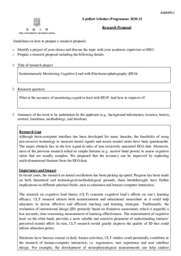LiA Blog
Week 1: Researching & Training
Gaining a basic awareness and knowledge of different climate change issues and an overall idea of design thinking. Personally, I learned most about how to empathise with the target audience and how to create a concrete, actionable direction.
Week 2: Building the programme & Training
I learned how to ideate effectively, which includes developing a better understanding of the local situation and how we can brainstorm a solution around a given set of circumstances. The ideating process also made me aware of my communication strategies to ensure the discussion with my partner was effective and efficient.
This is the first time I got to learn about design thinking. I think this is something that is very transferrable across different fields in terms of how to approach a problem and develop practical solutions to address it.
Also, I also think learning how to manage a project — especially virtually — is very useful in this day and age. The Makesense team themselves has demonstrated a very organised way of project management with the use of various online tools.
Week 3-4: Communicating & Recruiting
I learned more about different social media strategies. More importantly, the ways to communicate our ideas and message effectively to the general audience, including creating individualised purposes for different people to get them on board. I also got to know more about the tricks to managing a team virtually, such as setting up an online workstation etc.
Week 5-6: Re_acting & evaluating
I learned how to review our prototypes in a systematic way and team management. We split our group of volunteers into three different task forces, so we need to gather feedback from different perspectives and create timely adjustments to our plan.
Overall
First and foremost, I believe the programme has made me more aware of various climate issues, especially those in Hong Kong. As a person who is not the most passionate about environmental issues and had no relevant training in the field, this is a valuable opportunity for me to learn something new. Learning more about the current plastic consumption and the recycling situation in Hong Kong, allow me to develop a sympathy for the environment that I am living in. Also, I am now aware of what exactly I can do on a personal level to help.
The practical knowledge of design thinking is also something that would definitely be useful in the future, no matter which field I will be working in. I think it is not just a set of tools or processes, but a general problem-solving mindset. I am interested in social innovation and making an impact in my community in general. Therefore, I think the mindset and knowledge I learned from design thinking would help me translate my vision into concrete actions.
In the programme, I got to exchange ideas and learn from people coming from different parts of the world, which was very inspiring and refreshing. Although the virtual experience limited our interaction, I still got to get a glimpse of the issues that they were facing in their area and how they were approaching the problems. I believe the cross-cultural experience is something that is unique about the programme, which has widened my horizon. The insights I gained from the discussions and seminars will definitely allow me to think more flexibly when approaching a new problem.
Leading a group of volunteers virtually was something that I had never done before. This is actually very valuable to me, as I see this kind of work setting would only be more and more common in the post-pandemic era. It is difficult to motivate and mobilise people – even more so when done remotely. I think Davizz and Lau have done an amazing job of showing us exactly how to do that. This is something that I did not expect to learn from the programme.
Last but certainly not least, the programme encouraged us to try. Frankly, it is difficult to achieve something big in just weeks, but I guess part of what the programme was trying to teach us was the importance of taking action. There are no perfect plans, we are going to make mistakes or bump into deadends at some point. But it is more important to take the first step.
All in all, ‘re_action for climate’ was an inspiring programme packed with practical skills and space for trial and error. It encourages social responsibility and real-world impact. An incredible, eye-opening experience!

Please sign in
If you are a registered user on Laidlaw Scholars Network, please sign in